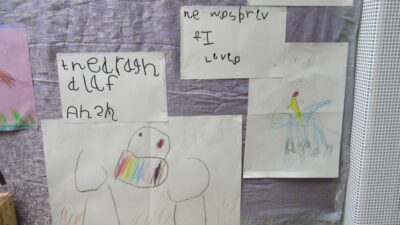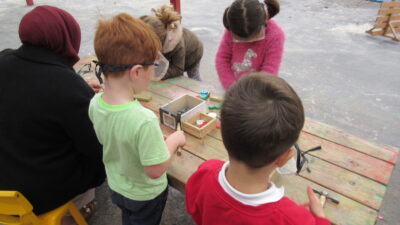We provide child-centred, high quality learning through play and exploration that fosters curiosity, confidence and a love of learning.
In our increasingly complex and rapidly changing world it is essential that children develop the skills that will enhance their life chances. These include the ability to:
- ask questions, think creatively, solve problems and reason
- share their opinions and ideas, articulate an argument

- collaborate
- use numbers fluently
Children need to develop the following personal qualities:
- empathy
- resilience, including in the face of stress
- trust and trustworthiness
Our ambition is to provide our young children with the foundations of these skills and attributes upon which to build as they grow, developing them within a broad and balanced curriculum.
We are committed to providing significant opportunities for pupils to master basic skills in Reading, Writing and Mathematics from an early age. Our curriculum is drawn from the Early Years Foundation Stage and the National Curriculum. In addition we draw upon high quality resources such as the Power of Reading and the National Centre for Excellence in Teaching Mathematics to ensure children are successful in gaining key skills.
The development of oracy and positive attitudes to learning are integral to our curriculum offer.
We use a cross curricular and inclusive approach to learning which engages with children’s natural curiosity while ensuring that we cover all the statutory requirements. Much of our learning is planned from quality books chosen to provide a stimulus for inquiry and creativity.
Teachers use a wide variety of teaching methods, which are adapted to ensure all children can access learning.
All children in KS1 participate in 2 hours of weekly physical activity (PE) as well as extended access to the outdoors.
Religious Education, Music and computing are taught as standalone subjects with links made where appropriate.
We follow the Local agreed syllabus for Religious Education: www.newham.gov.uk/schools-education/school-curriculum/6
PSHE and RHE are interwoven into our curriculum. In KS1 the RHE curriculum is as follows: PSHE and RHE in KS1 at Woodgrange
Our curriculum is underpinned by our vision and values
Vision |
A nurturing school at the heart of the community |
||
Core values |
Child centred, needs led We have high expectations of all children regardless of their background or abilities. The needs, interests and well-being of children are at the heart of all decision making. We work in partnerships to promote the best outcomes for all children. |
High quality We strive to be the best and provide the best for each and every child, empowering staff to adapt provision and be responsive to the children’s needs. We seek consistency without demanding uniformity. |
Playful We understand how young children learn and have designed our curriculum and our pedagogy to reflect this. Our curriculum aims to stimulate enquiry, challenge children to think creatively and be purposeful in how they apply their knowledge and develop their skills. |
Strategic approach |
Open We actively invite feedback from our stakeholders. We have comprehensive strategies in place to ensure parental voice is heard and evaluated. We are receptive to new ideas and enthusiastic about how we adapt them to our context. |
Reflective We are never complacent. We constantly evaluate our provision and seek to improve. We listen and respond positively to feedback. We seek external verification. |
Intelligent We use evidence and research to inform our practice. We fully understand our context and the needs of our pupils and their families and ensure our priorities are relevant and our actions fit for purpose. |
Our aims are for all children:
|
|||||
| Curriculum components | |||||
| Knowledge and understanding General, subject specific, social and cultural knowledge In English, maths, science, Art & design, computing, Design technology, history, geography, RE, |
Skills Essential core skills in communication, reading, writing and maths, computing, Physical, personal, social, moral, spiritual and thinking skills |
Attitudes and attributes Our learning powers: curiosity, reflectiveness, resilience, cooperation Questioning, collaborating, risk taking, adaptability, confidence, tolerance, openness, empathy and respect |
|||
| How is the curriculum implemented? | |||||
| Child-centred, needs-led | High quality | Playful | |||
| Children are known well, accurate assessment Responsive teaching Excellence in provision for pupils with SEND Follow children’s interests Emphasis on first hand experiences and exploration |
Mastery in maths Systematic teaching of phonics and reading Quality first teaching Deliberate practice of the “tricky bits”(LPA) Spiral curriculum Specialists in PE and music |
Authentic purposes and contexts for learning Genuine links and connections Core books as foundation of plans Extensive access to outdoor learning Open ended opportunities |
|||
| What will it look like? What impact? | |||||
| Progress in knowledge Broadening of vocabulary, making connections and links, applying knowledge in new contexts |
Progress in skills Fluency, Accuracy Presentation Pride in achievements creativity |
Progress in attitudes Learning powers- resilience, reflectiveness, response to feedback, determination |
Engagement Behaviour, self regulation Attendance high Concentration and sustained thinking |
Well being social, emotional and mental health, “bounce back”, Confidence Enjoyment of learning |
Citizenship Empathy, value self and others,, responsible, contribution trusting and trustworthy |
| How will we know? | |||||
| Observing learning, children’s books, Speechlink assessments, phonic assessments, book band progress, Wider curriculum journals, photos of learning process, special books (EYFS) | Observing learning, talking to children, children’s books, Wider curriculum journals, outcomes in RE week, observing children at play, behaviour logs, Leuven scales (well being/ engagement), Special books, attendance data, parent surveys | ||||
Our Curriculum is thoughtfully designed to support children to make links between concepts as they encounter an idea or revisit a concept. This is underpinned by a coherent, sequenced plan for individual subjects.
Religious Education teaching follows the programme devised by the London Borough of Newham SACRE. It is multi faith and seeks to explore how communities are similar rather than different.
All faiths are valued. Parents do, however have a legal right to request their child is withdrawn form RE lessons. This must be applied for in writing to the Headteacher, setting out valid reasons for the request. To date no parents have requested this.

